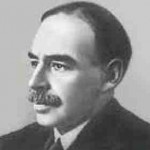How could we not? Two of our favourite things combined in the one package. Sex and Economics. Irresistible. So here we are with an article by Sean O’Grady, published in the Fin Review, 17 March 2015.
Putting “sex lives of politicians” into Google yields 6820 hits. The Roman emperors score 3220. For great artists, it’s a respectable, if that’s the word, 2090 hits. But “sex lives of economists”? “No results found”.
Perhaps that’s to be expected for what Thomas Carlyle described as the “dismal science”. Yet the greatest and most revolutionary economist of the 20th century, John Maynard Keynes, applied the same sort of unconventional adventurism to his sex life, and this most intellectual of men was also possessed of considerable carnal curiosity. In the latest biography of him, by Richard Davenport-Hines, we learn a great deal more about his habits.
Basically, Keynes collected and catalogued his sexual activities as obsessively as other men did postage stamps (indeed that was an early hobby of his – make of it what you will). He kept detailed records of encounters, with names or initials of partners, allocated by year from 1901 – his first sexual experience, with a fellow Etonian, at age 17 – though the classification had ceased by 1925, when he married the Russian ballerina Lydia Lopokova. She was no beard – they were deeply in love, and apparently greatly enjoyed foreplay: “I want to be foxed and gobbled abundantly,” he once wrote, while she referred to his “nimble fingers”. He wasn’t a perfect lover, however, and was rumoured to suffer premature ejaculation. Wittgenstein went on honeymoon with them, which can’t have helped.
CHANGING PREFERENCES
Bi, bi-curious, gay, straight, or what? Keynes seems, successively, predominantly homosexual and then mostly heterosexual, changing his mind – radically – about the balance of his sex life in middle age, much in the way he rejected classical economics for his new theories. (“When the facts change, I change my mind. What do you do, sir?”) Before then – it’s not known whether he was monogamous after his marriage – he was promiscuous and in Edwardian times, as now, there was plenty of cruising, if you wanted it. And Keynes did. He went “feasting with panthers” in railway carriages, Cambridge colleges, and across London – Soho and Bloomsbury were centres of this demi-monde, as were public parks and baths. One list reveals his catholic tastes: “Stable boy of Park Lane; The Swede of the National Gallery; The Soldier of the baths; The French Conscript; The Blackmailer; sixteen-year-old under Etna; Lift boy of Vauxhall; Jewboy; Grand Duke Cyril of the Paris Baths…” He had 65 encounters in 1909, 26 in 1910, 39 in 1911…
Thus did Keynes at least meet people from less privileged backgrounds and less clever than he – which may have made him more liberal and tolerant. That in turn gave his economic mission – to ensure everyone had the means of life and to enjoy the arts – a personal motivation. There were longer lasting affairs too, the most significant being with Duncan Grant, an artistic dilettante and former lover of Lytton Strachey. When the latter found out about Maynard it sparked a bitchy reaction; “Oh heaven! Heaven! The thought recoils, and I find myself shrieking and raving.” Keynes was “reeking of that semen”.
Rent boys were not ruled out, nor menages a trois. A Mrs Anderson, for example, was picked up because she wanted to watch “you two boys having a bit of fun together”. This later developed into a foursome, with a bowler-hatted young man from Ealing joining in: Keynes nipped out to get him much as you might pop to the shops if you’d run out of milk.
The Cleveland Street Scandal of 1889 alerted wider society to the practice of men procuring GPO telegram delivery boys for cheap sex in makeshift brothels (four shillings the going rate – about $45 now). Yet even after the life sentence laid down for sodomy in an 1885 law (it’s an apocryphal story that lesbianism was omitted because Queen Victoria couldn’t understand it), and the trial of Oscar Wilde for gross indecency, things were less repressive in Keynes’ day than in the 1950s, when police persecution and entrapment of men such as Alan Turing, John Gielgud and Lord Montagu peaked in its cruelty. One wonders what we might have lost had Keynes, who died in 1946, suffered what Turing did.
The mighty mathematician Keynes did not discover a correlation between his luck in bedding his conquests and movements in national income. A link between gross domestic product and gross indecency would have been a great discovery: about the only opportunity this econo-sexual missed.
‘Universal Man: The Seven Lives of John Maynard Keynes’ by Richard Davenport-Hines is published by William Collins in the UK.

